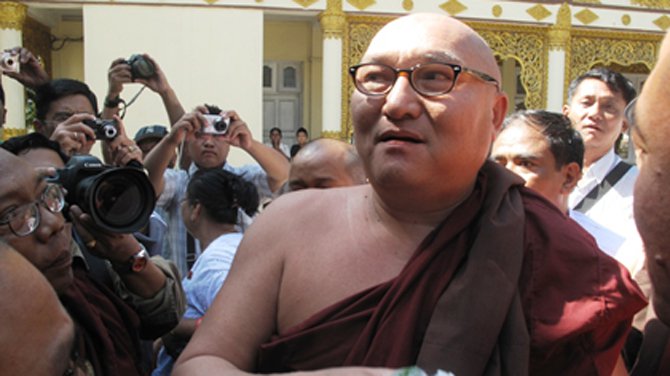RANGOON — A prominent Buddhist abbot has reportedly been banned indefinitely from giving public sermons by the State Sangha Maha Nayaka Committee, also called the Mahana, Burma’s highest religious authority.
A letter bearing the Mahana’s official insignia and signed by one of its members circulated on social media announcing that Ashin Pyinna Thiha, commonly referred to as Shwe Nya Wah Sayadaw, is no longer authorized to give public religious talks because he “is not acting as Dhamma teacher.”
Labeling the monk, who is the abbot of the Shwe Nya Wah Monastery in Rangoon’s Hmawbi Township, as “disobedient”, the letter urged state and divisional governments to enforce the ban as local Sangha committee members recommend.
One of his disciples told The Irrawaddy that the monastery has not been directly informed of the ban from the Mahana but that the abbot is aware of the new restrictions and has been subject to similar prohibitions in the past.
The announcement followed a recent complaint by Rangoon Division Sangha members that the abbot was delivering sermons unrelated to Buddhism. Ashin Pyinna Thiha is widely known as an outspoken monk who often speaks publicly about politics and is close with Burma’s leading opposition party, the National League for democracy (NLD).
The abbot has provided material assistance to student demonstrators, and some of his recent Dhamma talks have openly criticized a recent crackdown on the movement in central Burma that resulted in many injuries and more than 100 arrests. He has also provided assistance to several monks who were injured by police later found to have used white phosphorous against demonstrators in Letpadaung in 2012.
The 47-member Mahana has banned him from giving public sermons in the past. In February 2011, he was banned from public speaking for one year shortly after meeting with then-US Secretary of State Hillary Clinton. He said at the time that he did not know if the ban was related to their meeting, but that the council had increased pressure on him since.
He has also been denied permission to give Dhamma talks in some areas by divisional religious affairs departments. A talk scheduled for Nyaung Zin village in Dawei’s Tayatchaung in February was cancelled on those grounds.
The abbot enjoys a broad support base among the rural population, poor laborers and students, and is known for his long-standing sympathies toward Burma’s political opposition.
He recently told Radio Free Asia that he felt he was being targeted by the Mahana, which is government-appointed and strongly supportive of other Buddhist figures that have the backing of the government.

















